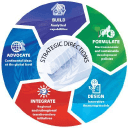
Email address and contacts
Established by the Economic and Social Council (ECOSOC) of the United Nations (UN) in 1958 as one of the UN's five regional commissions, ECA's mandate is to promote the economic and social development of its member States, foster intra-regional integration, and promote international cooperation for Africa's development. Made up of 54 member States, and playing a dual role as a regional arm of the UN and as a key component of the African institutional landscape, ECA is well positioned to make unique contributions to address the Continent’s development challenges. ECA’s strength derives from its role as the only UN agency mandated to operate at the regional and subregional levels to harness resources and bring them to bear on Africa's priorities. To enhance its impact, ECA places a special focus on collecting up to date and original regional statistics in order to ground its policy research and advocacy on clear objective evidence; promoting policy consensus; providing meaningful capacity development; and providing advisory services in key thematic fields. ECA also provides technical advisory services to African governments, intergovernmental organizations and institutions. In addition, it formulates and promotes development assistance programmes and acts as the executing agency for relevant operational projects. ECA is headed by an Executive Secretary, who is assisted by two Deputy Executive Secretaries. Its work programme is supported by two pillars: knowledge generation and knowledge delivery. There are five substantive divisions responsible for policy research: Macroeconomic Policy, Regional Integration & Trade, Social Policy Development, Special Initiatives, and the African Centre for Statistics. The Capacity Development Division, IDEP (ECA’s training arm), the Division of Administration and ECA’s Subregional Offices in Rabat, Niamey, Yaounde, Kigali and Lusaka comprise the knowledge delivery pillar.
874
Ethiopia

